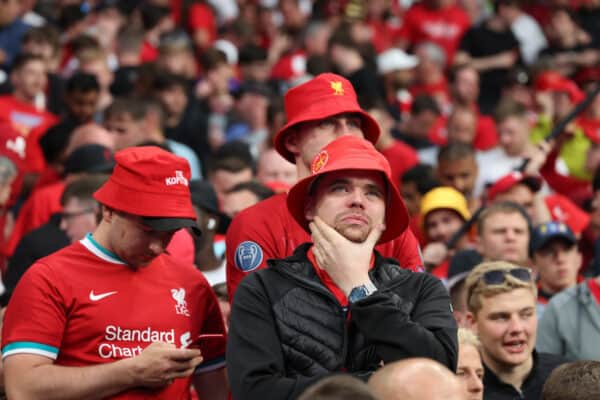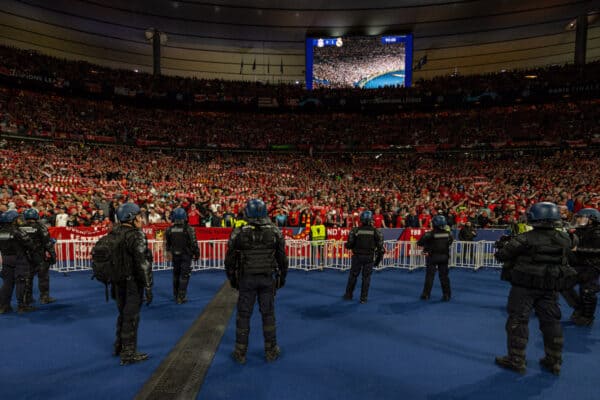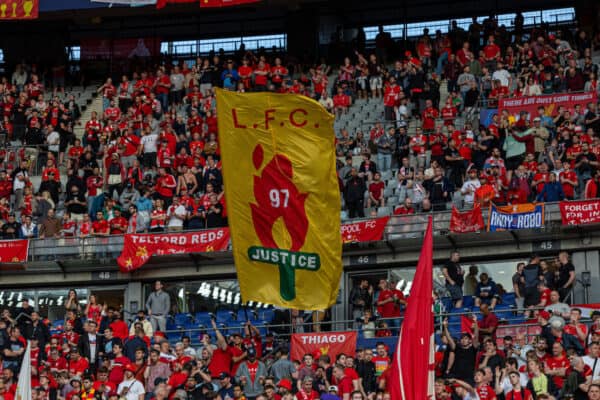The Liverpool supporters union, Spirit of Shankly, who gave evidence to the Independent Panel Inquiry into events surrounding the 2022 Champions League final, have released a statement on the findings of the inquiry.
The statement reads:
Liverpool fans have been cleared of blame and responsibility for the horrendous situations that occurred in and around Stade de France that night.
What should have been the highlight of the season for travelling supporters of Liverpool and Real Madrid – in UEFA’s words a ‘festival of football’ – turned out to be a maelstrom of chaos and alarm that led to some fans fearing for their life.
The blame game began even before a ball was kicked, and in the immediate aftermath those supposedly in charge – UEFA and the authorities – had no hesitation in pointing the finger at supporters.
But now with the publication of the report, it is clear, the fans bear no culpability with the panel concluding “overarching organisational failures” were the root of what went so badly wrong. A remarkable absence of joint working between the major stakeholders – UEFA, the French authorities and French Football Federation – from when the final was moved to Paris, in February, up to and including the day of the match itself resulted in pandemonium.
UEFA and the authorities sought to deflect any responsibility with the panel stating: “The public response of UEFA in the aftermath of the problems on the night and in its subsequent evidence to the Senate was striking in its orientation to protect itself. It was a serious error for UEFA to assume it could avoid accountability for a foreseeable near disaster at its flagship event.”
The panel identified eight factors that contributed to what happened. Among them the safety and security of those attending the game. This, they said, was compromised for a “securitised approach” based wrongly on the assumption that LFC supporters posed “threats to public order”. In other words, a non-existent threat of football hooligans.

This action of putting order above safety ultimately led to a situation where there was real danger of a fatal crush. Scores of fans continue to suffer from PTSD as a result and the panel did not shy away from drawing parallels with Hillsborough.
The crush outside the stadium perimeter where thousands, including many of Liverpool’s disabled supporters, were held in a bottleneck started hours before the game. In fact, the inquiry notes that at 3.30pm, a UEFA security officer began an inspection of the security and ticket check perimeter and found entrance ASP3, where the majority of Liverpool fans were directed, was “not fit for purpose”. Nothing was done about it.
As for the idea that problems were caused by thousands turning up ticketless, it has been roundly dismissed. While it is accepted some did try to gain access without a ticket, there are no firm numbers and the panel adjudged it to be no more than is usual at a major sporting event, such as the Champions League final.
Systemic failings from directing thousands to take just one mode of transport – RER D, rather than also utilising RER B – to ticket checks not working, having no plan for dealing with a large local influx, commonplace and expected at events at Stade de France, and removing signage that would have made it easier for fans to know where they are going, combined to turn UEFA’s showcase finale into a near disaster.
Once a city agrees to host such an event, travelling supporters, the Panel state, should assume they will be welcomed and treated as any other visitor. In Paris, last May, they were not. They were corralled in fan zones, not knowing they would be able to watch the game there until it was announced at 4pm, barred from wearing club colours in parts of the city and seen as a crowd to be controlled.
The fans have been exonerated. A breakdown in communication on the day, the failures of UEFA, the French police and authorities were to blame. The shame – beginning with the stadium billboard announcing kick-off was delayed due to fans arriving late, supporters being tear gassed and pepper sprayed, pick-pocketed and attacked, people frightened they were going to die – is on them.
We would like to thank the Panel for their forensic approach, dedication and analysis in finding the truth. They finish their report with 21 recommendations for hosting and organising future events.
We would expect UEFA and the authorities to act upon each of these. We also expect an apology for the lies and smears UEFA so quickly aimed at supporters, without whom their competition and showcase final would be nothing.

Eight factors Identified by the Panel that caused or contributed to the conditions which almost led to disaster:
- A substantially larger number of Liverpool supporters were directed to train line RER D, compared to the volume of people attending other major events at the stadium by that route.
- Defective route planning between RER D train and the stadium, resulting in too many people being directed to Additional Security Perimeter entrance 3 (ASP3).
- Defective access arrangements at ASPs. The effect of this was particularly acute at ASP3 because of the increased pressure created by the flawed routing, and that it was positioned on a restricted access ramp: a bottleneck.
- The use of two different forms of tickets without extra measures to maintain throughput rates.
- Defective turnstile arrangements, which failed to guarantee safe entry.
- The activities of large groups of locals, some involved in attacks on supporters and attempts to breach the turnstiles to gain entry to the stadium, and a failure to police them.
- The use of tear gas and pepper spray in the confined space on the concourse.
- A lack of contingency relating to additional perimeter and turnstile access: there was no Plan B when things went wrong.
The Panel also identified two further matters that exacerbated these factors: the late change of venue, and a remarkable failure of joint working or interoperability.
The panel approached all major stakeholders, including UEFA, the French police and authorities, the French Football Federation, mayors of both Paris and St Denis and transport networks, and received countless eye-witness reports during their investigation.
















Fan Comments